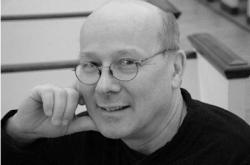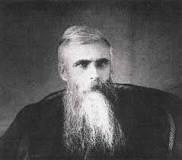Planning worship?
Check out our sister site, ZeteoSearch.org,
for 20+ additional resources related to your search.
- |
User Links
Person Results
Andrew Donaldson

b. 1951 Person Name: Andrew Donaldson, 1951- Paraphraser of "You thirsty ones" in The Book of Praise Andrew Donaldson, a composer and church musician, grew up in northern Ontario, Canada. He attended Glendon College, York University in Toronto, receiving a Bachelor of Arts degree in 1974. He went on to study classical guitar performance at the Royal Conservatory of Music in Toronto, receiving its ARCT (Associate of Royal Conservatory Teachers) degree in 1979. Since then he has worked as a composer and performer in many contexts, in both French and English.
Andrew co-edited the Book of Praise (1997), Presbyterian Church in Canada, with Donald Anderson. Their company, Binary Editions, continues to administer copyright for the PCC.
In 2007 he was made a Doctor of Divinity, honoris causa, by Knox College of the University of Toronto, for his body of work in congregational song in the Presbyterian Church in Canada.
In 2011 Andrew and his wife, Wendy, moved to Geneva, Switzerland where Andrew works as a worship consultant to the World Council of Churches.
--Submitted by Andrew and Wendy Donaldson, 13 August 2013
Andrew Donaldson
Samuel F. Weber
b. 1947 Person Name: Samuel Weber Composer of "[Der Herr bricht ein um Mitternacht]" in Pilgerklänge
Samuel F. Weber
John Reynell Wreford
1800 - 1891 Person Name: J. R. Wreford Author of "Lord, while for all mankind we pray" in The Song Companion to the Scriptures Wreford, John Reynell, an English Unitarian minister, was born December 12, 1800, at Barnstaple; educated at Manchester College, and in 1826 became pastor of a Church in Birmingham. In 1831, on account of the failure of his voice, he withdrew from the active work of the ministry and, in conjunction with Rev. Hugh Hutton, established a school at Edgbaston. He wrote a History of Presbyterian Nonconformity in Birmingham, 1832, and Lays of Loyalty, 1837. He contributed fifty-five hymns to Rev. J. R. Beard's Collection, 1837. His most popular and valuable hymn is the one given in this book. The last years of his life were spent in retirement at Bristol, where he died in 1891.
—Hymn Writers of the Church by Charles Nutter
=================
Wreford, John Keynell, D.D., born Dec. 12, 1800, educated at Manchester College, York, and in 1826 succeeded the Rev. James Yates as co-pastor to the Rev. John Kentish at the New Meeting, Birmingham. In 1830 he published a translation of Cellerier's Discourse on the Authenticity and Divine Origin of the Old Testament. In the following year, in consequence of failure of voice, he withdrew from the Ministry, and in conjunction with the Rev. Hugh Hutton, Minister of the Old Meeting, opened a school at Edgbaston. In 1832 he published a Sketch of the History of Presbyterian Nonconformity in Birmingham; and in 1837, Lays of Loyalty, in celebration of the Queen's accession. He also contributed, in 1837, to the Rev. J. R. Beard's Collection of Hymns for Public and Private Worship 55 hymns, of which the following are still in common use:—
1. God of the ocean, earth, and sky. God seen in His Works. In various collections, including those by Page Hopps, G. Dawson, and others.
2. Lord, I believe; Thy power I own. For increase of Faith. In Martineau's Hymns, &c, 1840.
3. Lord, while for all mankind we pray. National Hymn. This is in a large number of collections of various denominations, and is by far the most popular of his hymns. Sometimes it begins with stanza iii., "O! guard our shores from every foe."
4. When my love to Christ[God]grows weak. Passiontide. In Longfellow and Johnson's Unitarian Hymns of the Spirit, Boston, U. S. A., 1864, "When my love to God grows weak." This is repeated in Martineau's Hymns, &c, 1873.
Dr. Wreford was also the author of several volumes of verse, chiefly devotional. The latter years of his life he spent in retirement at Bristol, and died there in 1881.
[Rev. Valentine D. Davis, B.A.]
-- John Julian, Dictionary of Hymnology (1907)
John Reynell Wreford
George Henry Trabert
1843 - 1931 Author of "With Deep Humility, O Lord" in The Hymnal and Order of Service
George Henry Trabert
Thomas Lake Harris

1823 - 1906 Person Name: T. L. Harris Author of "It is a harp of many strings" in Song-Hymnal of Praise and Joy Harris, Thomas Lake, born May 15, 1823. Under his name three hymns are given in the American Unitarian Hymns of the Spirit, 1864:—(1) "In every human mind we see" (The Soul God's Temple); (2) "Look up, O man, behold the same" (God All in All); (3) "O earth, thy past is crowned and consecrated" (Past, Present and Future).
--John Julian, Dictionary of Hymnology, Appendix, Part II (1907)
=====================
Harris, T. L., p. 1569, ii., was born at Stony Stratford, Bucks, and when three years of age went with his parents to America. He died at New York, March 23, 1006. His hymns were published as Hymns of Spiritual Devotion, N.Y., 1858. In his Preface, he says, "Many of the hymns were verbally communicated by individual spirits." [Rev. James Mearns, M.A.]
--John Julian, Dictionary of Hymnology, New Supplement (1907)
Thomas Lake Harris
Gottfried Neumann
1686 - 1779 Author of "At length released from many woes" in Church Book Neumann, Gottfried, was born at Hohenheida, near Leipzig, apparently Nov. 30, 1686. He studied at the University of Leipzig, and thereafter was licensed as a candidate of theology (i.e. general preacher). In 1710 he joined the staff of the Halle Orphanage, but was expelled from Halle as a Separatist, and went to Hanau. He was then for a number of years receiver of rents (Fruchtschreiber) at Bergheim in Wetteravia, Hesse, to the Count Isenburg Meerholz, living later at Himbach, and at Marienbom (1736-39). Himbach was the headquarters of Johann Friedrich Kock, one of the principal leaders of the sect of the "Inspired," and between 1714 and 1734 Neumann generally speaking belonged to this sect. During the visits which Count N. L. von Zinzendorf paid to Wetteravia, about 1730, Neumann felt drawn to the Moravian Brethren. He joined the Moravian Community at Marienbom, Hesse, in 1738. In 1747 he was living at Meerholz, where he remained till his death. In the Weekly Reports of the Unitys-Elders-Conference in Barby, No. xix. for May 9-15, 1779, is the entry, “7. We are advised from Wetteravia, that the aged brother Gottfried Neumann at Meerholz has recently entered into his rest." Neumann therefore probably died in the end of April or beginning of May, 1779 (Allgemeine Deutsche Biographie xxiii. 519; MS. from Diaconus J. T. Müller, Herrnhut, &c.) Three of his hymns, all written in 1736, are in the Brüder Gesang-Buch, 1778. One has passed into English, viz.:—
i. Ei, wie so selig schläfest du. Burial. Written on the death of Christian Ludwig, son of Count N. L. von Zinzendorf. This child died in his third year, at Ronneburg, Aug. 31, 1736. In the first printed copy of Neumann's hymn (preserved in the Archives at Herrnhut, along with the original MS., which is dated Sept. 3, 1736) is the footnote:—
"In the evening of the night, during which the young Count Zinzendorf blessedly fell asleep, on opening the hymn-book [the Herrnhut Gesang-Buch, 1735] with reference to that noble child, I chanced upon the hymn, 'Ei, wie so selig schlafest du,’ [p. 322, ii.] which I referred to his death."
When Neumann's hymn was included as No. 1284 in Appendix viii., circa 1739, to the Herrnhut Gesang-Buch, 1735, it appears in 5 st. of 4 1., beginning "Ei, wie so sanft verschlä fest du." In the Brüder Gesang-Buch, 1778, No. 1728, it begins: "Ei, wie so sanft entschl'dfest du," and in Bunsen's Versuch, 1833, is further altered to "Ach wie so sanft." The translations in common use are:—
1. Blest soul, how sweetly dost thou rest. A translation of st. i., ii., and of the anonymous 17th century st. described under “Ei, wie so selig" (p. 322, ii.), as No. 961 in the Moravian Hymn Book, 1801 (1886, No. 1259), and in J. A. Latrobe's Collection, 1841.
2. At length releas'd from many woes. A full and good translation by Miss Cox, in her Sacred Hymns from the German, 1841, p. 75. Included in full in the Pennsylvania Lutheran Ch. Book, 1868; and, abridged, in Alford's Psalms & Hymns, 1844, his Year of Praise, 1867, and others.
Another translation is: "Sweet slumbers now thine eyelids close." By Lady E. Fortescue, 1843, p. 24. [Rev. James Mearns, M.A.]
--John Julian, Dictionary of Hymnology (1907)
Gottfried Neumann
Rodolphe Petter
Author of "Tseheheto Tsemȧhene'tȧheto" in Tsese-Ma'heone-Nemeotȯtse (Cheyenne Spiritual Songs)
Rodolphe Petter
F. Belmont
Composer of "[Unveil mine eyes that of Thy law]" in Union Hymnal, Songs and Prayers for Jewish Worship. 3rd ed. Revised and enlarged.
F. Belmont


 My Starred Hymns
My Starred Hymns

